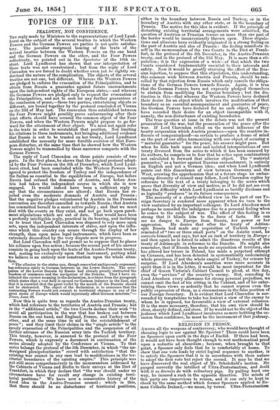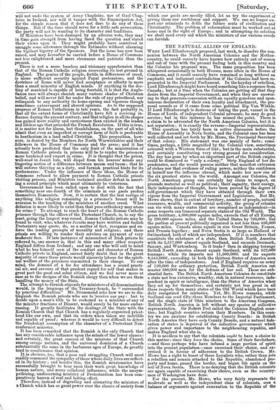RELIGION IN PRISON.
AMONG all the weapons of controversy, who would have thought of choosing logic to use against Mr. Spooner? There could have been no Spooners upon earth in the days of Euclid. If there had been, it would not have been thought enough to rest mathematical proof upon a reductio ad absurdum ; because, when brought to that point, a Spooner only feels that he is comfortably at home. To show that one vote leads by strict logical sequence to another, is to satisfy the Spooners that it is in accordance with their nature to adopt the first vote but reject the second. It may be that we have discovered the real object of Mr. Scholefield's motion. He gauged correctly the intellect of Ultra-Protestantism, and dealt with it as drovers do with refractory pigs. By pulling hard one way, he insured a rush in the opposite direction. The minds of this party are impervious to reason, and it can only be kept in check by the same method which former Spooners applied to Ro- man Catholic Ireland,—we mean, by terror. U1tra-Protestantism:1 will not undo the system of Army Chaplains, nor of Gaol Chap labs in Ireland, nor will it tamper with the Emancipation Act, for the simple reason that it does not dare to do any of these things. But if the time should serve for a little safe persecution, the party will not be wanting to its character and traditions. If Ministers have been damaged by an adverse vote, they may in time gain strength from having faced the question and stated their views upon it. They might probably have contrived to smuggle some allowance through the Estimates without alarming the vigilant bigotry of the Spooners. But the issue has now been raised, and may hereafter be carried before a House of Commons not less enlightened and more strenuous and patriotic than the present.
There is not a more baseless and visionary apprehension than that of the Roman Catholic religion recovering its lost ground in England. The genius of the people, fertile in differences of creed, is alone sufficient security against Papal pretensions, and the doctrines of Rome will never find acceptance or affinity in more than a small minority of English minds. If anything in the des- tiny of mankind is capable of being foretold, it is that the Anglo- Saxon race will always cherish many various shades of Christian belief, and will never fall far under the rule of any priesthood, nor relinquish to any authority its home-sprung and vigorous though sometimes extravagant and absurd opinions. As to the supposed progress of Roman Catholicism in late years, the fact probably is, that all the extant forms of Christianity have felt a reviving in- fluence during the present century, and that religion in all its shapes has gained more reality and earnestness than existed in the leaden and lifeless age that preceded the French Revolution. If this is true, it is matter not for alarm, but thankfulness, on the part of all who admit that even an imperfect or corrupt form of faith is preferable to heathenism in a land called Christian. This proposition, how- ever, is denied by the Members for North Warwickshire and their followers in the House of Commons and the press; and it has actually been predicted that the only fruit of the ministration of Roman Catholic priests in prisons will be to render the prisoners more hardened and expert in crime. It is thought that the priest, well-read in Jesuit lore, will dispel from his hearers' minds any lingering notion of a difference between meum and tuum ; that he will enforce thieving as a duty, and furnish practical hints for its performance. Under the influence of these ideas, the House of Commons refused to allow payment to Roman Catholic priests visiting prisons, and Ministers sustained another defeat in assert- ing a sound principle which must ultimately be victorious.
Government has been called upon to deal with the fact that something near one-fourth of the criminals in our gaols profess themselves Romanists. Now, it is certain that the last vestige of anything like religion remaining in a prisoner's breast will be aversion to the teaching of the ministers of another creed. What delusion is more likely to exist than that pure orthodoxy may atone for crime ? To attempt to reach the heart of the Roman Catholic prisoner through the offices of the Protestant Church, is, to say the least, going the longest way round. Roman Catholic priests may be found to visit, who, whatever Jesuits may have written and foolish Protestants may quote, do, as a matter of fact, recognize and en. force the leading precepts of morality and religion ; and these prieats are willing to render their services on payment of very moderate fees. If late instances of misconduct of Irish priests be referred to, one answer is, that in this and many other respects England differs from Ireland ; and any one who will call to mind what he has himself seen of the conduct and character of Roman Catholic priests in England, cannot fairly doubt that in the great majority of cases those priests would sincerely labour for the spirit- ual welfare of the prisoners committed to their charge. To our mind, the demand of a fee for attendance has a sound practi- cal air, and savours of that prudent regard for self that makes in great part the good and sober citizen, and we feel never more at ease as to the designs of the Romish clergy than when we see them handling the money of the State.
The attempt to furnish stipends for ministers of all denominations would, in the language of the Treasury-bench, be "surrounded by practical difficulties." Mr. Drummond asks how we are to dis- tinguish the Romish priests who are to :receive our pay : but to decide upon a man's title to be reckoned as a minister of any of the minuter fractions of Dissent, would surely be far more embar- rassing. g. It greatly facilitates the dealings of the State with the Romish Church that that Church has a regularly-organized priest- hood like our own, and that its orders when taken are indelible and capable of proof; whereas it would be very difficult to detect the fraudulent assumption of the character of a Protestant Non- conformist minister.
It has been remarked that the Romish is the only Church that has any considerable influence upon the minds of the lower classes : and certainly, the great success of the missions of that Church among savage nations, and the universal dominion of a Church substantially the same in the barbarous ages of Europe, do greatly tend to countenance that opinion.
It is obvious, too, that a poor and struggling Church will most readily command the sympathy of those whose daily lives are reflect- ed in its history ; and besides this, the Romish missionaries have successfully brought to bear upon their work great knowledge of human nature, and many collateral influence; while the unsym- pathizing, undiscerning ministry of Protestantism has been com- paratively barren of real and lasting effect. Therefore, instead of degrading and alienating the ministers of a Church which has so great power over the classes of society from which our gaols are mostly filled, let us try the experiment of giving them our confidence and support. We can no longer ex- port our criminals to defile the future seats of civilization and Christianity. The problem of reformation must be worked out at home and in the sight of Europe ; and in attempting its solution we shall need every aid which the ministers of our various creeds can furnish.



































 Previous page
Previous page